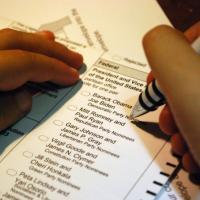Majority of Election-Related Tweets Are Likely to Go Unseen

When you’ve hit your limit, avoiding political ads on television, while certainly difficult, is doable. The sound can be muted or the channel changed—even if only for a minute.
Until now, avoiding election ads and arguments on your favorite social media outlets has been far more difficult as they’re not just coming from the candidates and their various super PACs but likely also from your friends and coworkers. But some are predicting that Twitter may become fairly worthless on election night, due to the sheer number of tweets that millions of people worldwide will be posting.
During the first debate between Obama and Romney, more than ten million tweets were sent in that hour and a half, burying people’s feeds in debate-related commentary that didn't do much more than eliminate the likelihood that most of them would ever be read.
More than 70 million Americans watched the 2008 election night coverage on television. At least that many, if not more, will surely watch on Tuesday, and a far larger number of them will be armed with mobile devices and numerous social media handles than in 2008.
Twitter and others are offering suggestions on how to prevent your account from being called a “high volume zoo” like it became during that first debate.
In the scope of social media’s advancements in the past four years, the 2008 election feels like an eternity ago. Obviously far more Americans are actively involved in social media than during the last election, but what truly puts this length of time in perspective is this fact, reported by the Washington Post:
In 2008, presidential hopeful Barack Obama leveraged social media and the online community to engage voters much more effectively than Senator John McCain, and many political experts and strategists believe this played a major role in Obama’s victory.
The fact that a candidate and his staff could have consciously decided to not exploit every social media channel available to promote himself is unfathomable in this day and age.
Along with the casual election observers offering their opinions, the world’s major media outlets will be racing to be the first to predict the winner, hopefully correctly, whether or not their tweets are ever unearthed.

